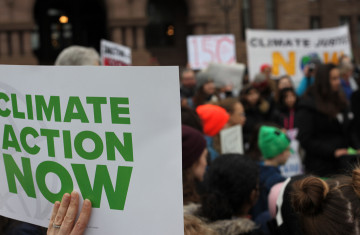A Generation Without Wonder
The winner of the first Dalton Camp Award for Best Student Journalist Essay is Fiona O’Flynn, a student at Ryerson University. Her essay A Generation Without Wonder, which reflects on social media, accountability and youth participation in our democratic culture.

My generation has never known wonder. We have never known unresolved queries. The wingspan of an eagle, the capital of Bolivia, how to cook quinoa—all are available instantaneously to us. Virtually all the vast wealth of knowledge known to humankind is right there at our fingertips. Consequently, my generation cannot claim ignorance; with our heightened awareness of the state of the world comes heightened responsibility for it. This responsibility is ensured through social media, which is a system of accountability, and often the very mechanism by which we educate ourselves. As we rise from the rubble of puberty, preparing to assume power, we become responsible for the creation of our desired future.
It is October, and I am sitting in a café with my friend. She asks if I have voted yet. Being first-time voters, we fumble our way through a conversation about the upcoming federal election. She tells me that all she needs to know is which party has the most progressive stance on climate change. Her rationale is simple: “The rest won’t matter when our planet is irreversibly fxxxed-up.” I show her an interactive by CBC comparing the different parties’ projected climate emissions by the year 2030. Within seconds her mind is made up: she will vote for the Green Party. This may seem like a troubling anecdote—it was to me, initially. How could she decide so quickly? My friend is not an anomaly, though. The fact remains that a single-issue voter has always existed and, inevitably, will always exist. What has changed is the method by which we educate ourselves about the issues. As access to information becomes more immediate, political involvement becomes more expected. From 2011 to 2019, voter turnout in federal elections for people aged 18 to 24 increased, and online platforms have become areas for political dialogue. Jagmeet Singh, the leader of the New Democratic Party, uses the social media app TikTok to engage with his younger audience through a clever mix of popular dances and partisan information. New media has revolutionized the political landscape, enabling my generation to educate ourselves and exercise our involvement wholly and effortlessly.
The internet, and the new media it contained, pulled back the curtains on issues like climate change, revealing the true uncertainty of the state of our world.
The people of my generation hold each other accountable. Born on a dying planet, we have grown up under the looming dark cloud of climate change. In school, we were taught to recycle. We were told that fossil fuels were the villains behind global warming. Though that is not entirely untrue, we were not given the whole story. The whole story came to us through the internet: the secondary education of my generation. The internet, and the new media it contained, pulled back the curtains on issues like climate change, revealing the true uncertainty of the state of our world. The internet is how Greta Thunberg became an icon among my generation; at 16 years old, she was named Time’s 2019 Person of the Year. Her climate strike movement started with posts to her Instagram and Twitter accounts, which quickly gained traction, eventually amassing a platform with over 10 million followers. Thunberg uses this platform to both inform and mobilize her followers. United under her leadership, my generation became aware of the urgency of our situation, burdened with the knowledge that we have 12 years to act before climate catastrophe. Armed with this education, we rallied; action was the result of a generation with unparalleled access to information.
Social media works as both a conduit for information and a tool for mobilization. It has become a platform for the creation of our desired reality, ensuring social accountability through peer influence. Hashtags catalyze movements: Black Lives Matter, MeToo, Bell Let's Talk Day. These phenomena depict our shared ideals of racial and gender equality, mental health support and environmental stability. They are sculpting the future my generation wants; they reflect our values and prophesy our future.

Photo by Jasmin Sessler on Unsplash
It’s September, and I am at the Climate Strike in Toronto with a group of students who have taken the day off school to protest. I have never seen a bigger crowd—more than 15,000 people are in attendance. Participation in the march is common among my peers. It is the culmination of years of collective frustration, and indifference will not suffice. I check Instagram, because I am 19 years old and that is what I do. It is flooded with images of the march; it seems as though the whole world is here. An estimated 6 million people are marching in 185 countries, making it the biggest climate protest in history. And so the social media circle of accountability spins on. Looking at my surroundings, I see signs referencing internet phenomena, written in a lingo largely indecipherable to older generations. I see signs urging us to vote. I see signs begging for consideration for the next generation, a consideration ours was not awarded. Within each sign there is a message of urgency and desperation, the remnants of childhoods shrouded in the quiet, constant ache of uncertainty.
My generation has never known security. Despite our access to information, certainty eludes us. We will be the first generation with a lower life expectancy than our parents. Our gift of knowledge is also accompanied by the curse of restlessness. With our awareness come the gravity and weight of our precarious reality. It is precisely this uncertainty that propels us to act, to vote, to march, to mold the world we want. We have not been afforded the luxury of assurance, so we must try to create it.
With our awareness come the gravity and weight of our precarious reality.
Now it is March, and I, along with most of the country, am in self-isolation. The COVID-19 virus has halted normal life in Canada, causing an abrupt closure of schools and businesses. But not the internet: I check the news hourly and Twitter religiously. I monitor the situation in Ireland, where my grandmother lives. I check in on Washington, where my aunt, who has cystic fibrosis, lives. I check the status of every country my brother travels through in Asia. I keep an eye on news about the American-Canadian border, which has just been closed to non-essential travel, barring me from visiting my father in Hawaii. I am in each of these places at once, despite not leaving my dormitory.
Media literacy in the digital age means the ability to navigate the internet, utilizing its full potential; it is a common denominator of my generation. In the digital age, political awareness is no longer an option but a necessity. Consequently, political involvement is no longer an anomaly, but an expectation. In a world without wonder, ignorance is not a viable excuse. We have been served privilege on the silver platter of our cellphones, and wealth in the form of information. With my generation a new era was born, of restlessness and frustration, knowledge and power. An era given no choice but to act, to create a better future.
